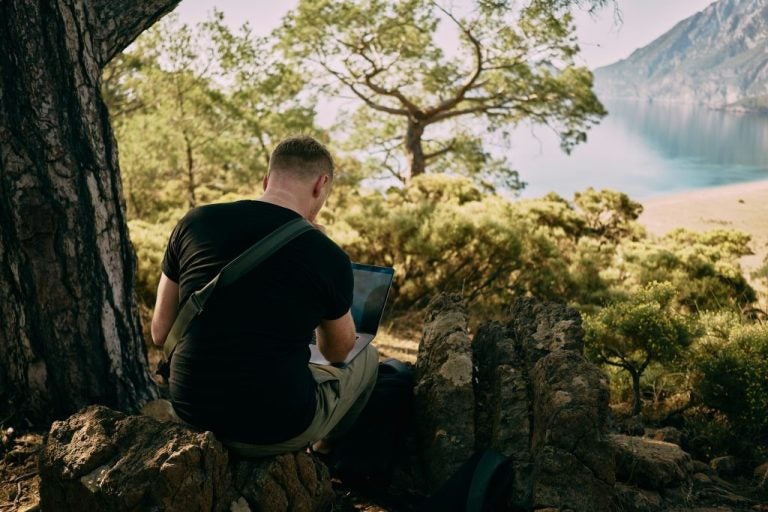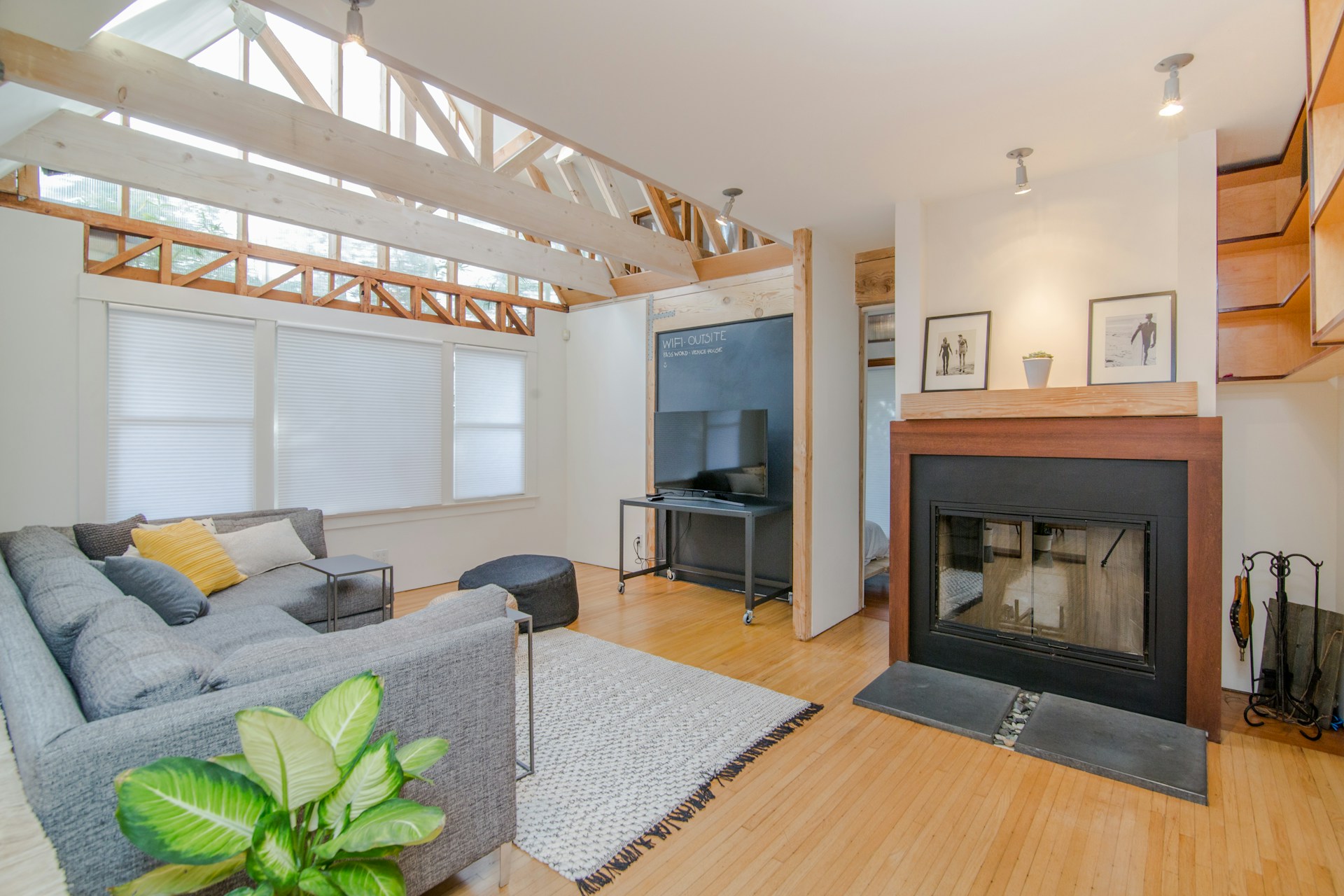What is a Digital Nomad? Comprehensive Overview and Definition
Find out in depth what is a digital nomad: how this lifestyle came about, the professions they choose and their tools of work.
In the digital age, the concept of work has evolved significantly. One of the most intriguing phenomena of this transformation is that of digital nomads. But what is a digital nomad? In simple terms, they are people who use technology to work remotely, allowing them to travel and reside in different parts of the world while fulfilling their job responsibilities.
We’ll take an in-depth look into the world of digital nomads—their origins, work styles, and the legal considerations for professionals embracing this lifestyle. It’s a unique way of combining the freedom to explore new destinations with the ability to sustain a thriving career.
What does it mean to be a digital nomad?
The term ‘digital nomad’ has gained popularity in recent years, but its meaning can vary depending on the context. These definitions will help you better understand this phenomenon:
- Digital nomad: An individual who uses technology to work remotely and moves from place to place, seeking new environments and cultural experiences.
- Remote working: A way of working that allows employees to perform their tasks from any location, as long as they have access to the internet. According to a study by Buffer, 97% of remote workers want to continue working in this way, indicating a strong preference for flexible working.
- Digital tourism: The practice of traveling to different destinations while working online, often associated with the digital nomad lifestyle.
What is the difference between digital nomads and freelancers?
Although the terms ‘digital nomad’ and ‘freelancer’ may seem similar, there are significant differences between them. Freelancers are independent professionals who offer their services to different clients, without being tied to a specific employer. They can work from anywhere, but do not necessarily lead a nomadic lifestyle.

In contrast, digital nomads combine remote work with a lifestyle of constant travel. According to a survey by MBO Partners, 79% of digital nomads believe that their lifestyle offers them greater satisfaction and higher income compared to a traditional job.
What is the difference between digital nomads and remote workers?
Remote workers are those who work from a location other than their company’s head office. While they may have the flexibility to work from home or in a café, they are not usually on the move. Digital nomads, on the other hand, choose to live in multiple locations and may change country or city frequently, depending on their preferences and circumstances.
A study conducted by Stanford University indicates that remote employees are 10% more productive than their in-office counterparts, highlighting the effectiveness of remote work. Digital nomads go one step further by balancing this productivity with exploring the world.

How did digital nomads emerge?
The concept of the digital nomad is not entirely new, but it has gained momentum thanks to the evolution of technology and global connectivity. In the late 1990s and early 2000s, the spread of the Internet and the development of communication tools such as email and video conferencing made remote working possible.
The 2008 global economic crisis played a crucial role in shaping the digital nomad movement. Many professionals, driven to seek opportunities beyond traditional workplaces, embraced a more flexible lifestyle that combined work with travel. The rise of digital platforms like Upwork, Fiverr, and others made it easier to find remote jobs, enabling individuals to work from anywhere and fueling the growth of this innovative way of life.
According to Statista, by 2021, the United States already had more than 15 million people identifying themselves as digital nomads. This number has been increasing as more companies adopt remote working policies.
What are the types of digital nomads?
There are different types of digital nomads, each with their own characteristics and approaches. At Holafly, we’ve taken a look at some of the most common categories:
- Adventure nomads: Adventure nomads are those who seek thrilling experiences and adrenaline in every place they visit. They usually opt for unconventional destinations and participate in outdoor activities such as hiking, scuba diving or surfing. This type of digital nomad may be attracted to places like Bali, where adventure culture is very present.
- Cultural nomads: This group prioritizes immersing themselves in new cultures, learning languages, and participating in local festivals and traditions. Their goal is to deeply experience and understand life in different countries. For instance, many nomads are drawn to cities like Lisbon, where the rich history and vibrant culture provide ample opportunities to connect with the local community.
- Luxury nomads: Some digital nomads prefer a more luxurious lifestyle. They opt for premium accommodation and high-end destinations, enjoying exclusive experiences while they work. This type of nomad may spend time at five-star resorts in places like the Riviera Maya, where they can enjoy high-end services.
- Entrepreneurial nomads: These individuals create and manage their own online businesses. Their work can range from e-commerce to consulting. Many of these digital nomads seek out new opportunities along the way, using their lifestyle to expand their network and employ new business ideas.
- Social nomads: Social nomads value personal connections and networking. They participate in local events and communities to meet other nomads and residents. Coworking communities are a common place for social nomads, where they can socialize and collaborate with other professionals.

What are the most common professions and how do digital nomads organize their work?
Digital nomads use a variety of methods and tools to perform their job functions from anywhere in the world. Let’s take a look at how they do it.
Most common professions for digital nomads
- Web developers: Technology professionals who create and maintain websites. According to the US Bureau of Labor Statistics, demand for web developers is expected to grow by 16% by 2032.
- Graphic designers: Artists who create visual content for a variety of platforms, from social media to websites.
- Consultants: Experts in different areas who offer advice to companies, from marketing to project management.
- Content creators: Bloggers, vloggers and podcasters who generate digital content and can monetize their work through advertising and sponsorships. A study by Influencer Marketing Hub reveals that the market for content creators and influencer marketing will be worth $24 billion by the end of 2024.
- Digital marketing specialists: Professionals who focus on promoting brands, products and services online, using SEO, SEM and social media strategies.
Important: If you are a frequent traveler and want to stay connected without worrying about expensive roaming or looking for a new SIM at every destination, Holafly’s subscription plans are for you. With a single eSIM, enjoy internet in more than 170 countries for a fixed price and no surprises on your bill. Travel without limits and connect easily and securely! 🚀🌍

Materials and tools most used by digital nomads
Digital nomads rely on a variety of tools, both material and technological, to carry out their work. Some of the most popular are:
- Laptop: An essential device that allows them to work from anywhere, whether in a café, on a beach or in a shared office.
- Ergonomic backpack: Designed to carry equipment comfortably and safely, ideal for those who move around frequently.
- Portable desks: Some nomads opt for folding tables or adjustable desks that allow them to create a functional workspace anywhere.
- Writing materials: Notebooks, diaries or pens and other tools to take notes or sketch ideas at any time.
- Project management software: Such as Trello or Asana, which help organize tasks and collaborate with teams, facilitating communication and project planning.
- Communication platforms: Zoom, Slack and Microsoft Teams facilitate interaction between colleagues, enabling virtual meetings and keeping in touch.
- Design and editing software: Adobe Creative Suite, Canva and other programmes are essential for designers and content creators. According to Forbes Colombia, Canva has seen a 50% increase in its user base during the pandemic.
- Cloud storage: Google Drive and Dropbox allow access to files from anywhere, which is vital for digital nomads who need to share documents and collaborate in real time.
- VPN (Virtual Private Network): Provides security when browsing the internet, allowing digital nomads to protect their personal information and access restricted content in different regions.
What are the ideal workspaces for digital nomads?
Digital nomads are flexible in terms of where they work. Among the most frequent spaces are:

- Cafés: A popular choice among nomads who enjoy a relaxed atmosphere and a good cup of coffee while working on their projects. According to a study by The Economist, 40% of remote workers opt for cafés as their workspace.
- Coworking spaces: These places offer a professional and collaborative environment, with all the amenities needed to work. Statista forecasts that by the end of 2024 there will be more than 40,000 coworking spaces worldwide.
- Beach or parks: Some nomads choose to work outdoors, taking advantage of the good weather and natural sights. This style of working has become popular in places like Tulum and Chiang Mai, where the surroundings are inspiring.
- Libraries: Quiet places with good connectivity, ideal for concentration. Many cities have modernized their libraries, offering comfortable workspaces and internet access.
What are the most common accommodations for digital nomads?
Digital nomads have a wide range of accommodation options to choose from in every destination they visit. Here are the most popular types of accommodation for digital nomads:
- Motorhome: A number of digital nomads choose to live in motorhomes, which gives them the freedom to move from place to place while having their home in tow. This lifestyle is ideal for those who enjoy adventure and nature.
- Colivings: Coliving spaces are shared dwellings designed specifically for digital nomads. These places offer accommodation, workspaces and opportunities to socialize with other professionals. The Selina lodging chain, for example, has seen significant growth in its coliving model, offering a tourism and social experience that has allowed it to expand to more than 22 countries.
- Hotels: Hotels are a common choice for nomads seeking comfort and additional services. Some hotels even offer special rates for extended stays, as well as work spaces. According to a report by the International Hotel Association, 70% of business travelers prefer hotels with good working facilities.
- Home exchange: Home exchange allows digital nomads to live in someone else’s home in exchange for offering their own home. This can be an inexpensive and enriching way to experience a new place.

In addition to the options mentioned, digital nomads often choose accommodations like rented flats, guesthouses, or campsites. The choice depends on individual preferences and lifestyle. In 2021, Airbnb reported a 100% increase in long-term bookings, highlighting the growing trend among digital nomads to seek temporary, flexible housing solutions.
What are the legal issues to consider as a digital nomad?
Working and living in different countries can pose legal challenges for digital nomads. It is very important to understand local laws and visa requirements.
- Visas: Obtaining an appropriate visa is crucial for digital nomads. Many countries offer specific visas for remote workers, allowing them to reside and work legally. According to a Nomadlist report, countries such as Estonia and Barbados have implemented digital nomad visas that facilitate this lifestyle. It is essential to research each country’s requirements before relocating. If you want to know the 42 countries that offer visas for digital nomads and the requirements to be met, you might be interested in reading our post.
- Taxation: Digital nomads need to be aware of their tax obligations. Depending on their nationality and time spent in each country, they may be subject to taxation in multiple jurisdictions. A study by accounting firm Deloitte suggests that 40% of digital nomads face tax confusion. Consulting a tax expert can help avoid legal and financial problems.
The concept of ‘tax residency’ is important. A number of digital nomads choose to take up residence in countries with a more favorable tax regime, such as Portugal or Malta, to minimize their tax burden.
With their lifestyle combining work and adventure, digital nomads are arguably redefining the way we think about work in the 21st century. As technology continues to advance and more opportunities to work remotely are created, this phenomenon is likely to continue to grow and evolve. From choosing professions that enable mobility to exploring different cultures and communities, digital nomads are forging a new path in the workplace.
If you’re thinking about becoming a digital nomad, it’s important to stay informed about your options and challenges. Check out our 2025 guide to being a digital nomad for valuable insights. Whether you’re seeking a lifestyle change, new career opportunities, or the chance to explore the world, the digital nomad journey offers the freedom and flexibility you’ve been dreaming of.
Frequently asked questions about digital nomads
The term is considered to have been popularized by the book ‘The Digital Nomad’ by Tsugio Makimoto and David W. M. O’Leary in 1997, but the practice of working while traveling has existed informally for decades.
Although exact figures vary, it is estimated that there are more than 35 million digital nomads in the world, and this number continues to grow. A report by MBO Partners predicts that this number could reach 100 million by 2035.
Key skills highly valued include the ability to work independently, technical expertise in your field, strong communication skills, and cultural adaptability.
Safety varies by destination, but many digital nomads take precautions by choosing safe locations and educating themselves about the local culture. Platforms such as SafetyWing offer health insurance specifically for digital nomads, which adds an extra layer of security.
Many digital nomads seek out online communities and participate in networking events to make social connections while traveling. There are platforms such as Meetup and Facebook Groups that make it easy to connect with other nomads.
Countries such as Portugal, Thailand and Mexico are popular with digital nomads due to their affordable cost of living and welcoming communities. A NomadList study ranks Bali and Chiang Mai as two of the friendliest destinations for digital nomads.
Yes, there are specific health insurances for digital nomads that cover medical care in multiple countries, which is essential to ensure their well-being while traveling. Companies such as World Nomads offer insurance tailored to the needs of digital nomads.





 Language
Language 


















 No results found
No results found








